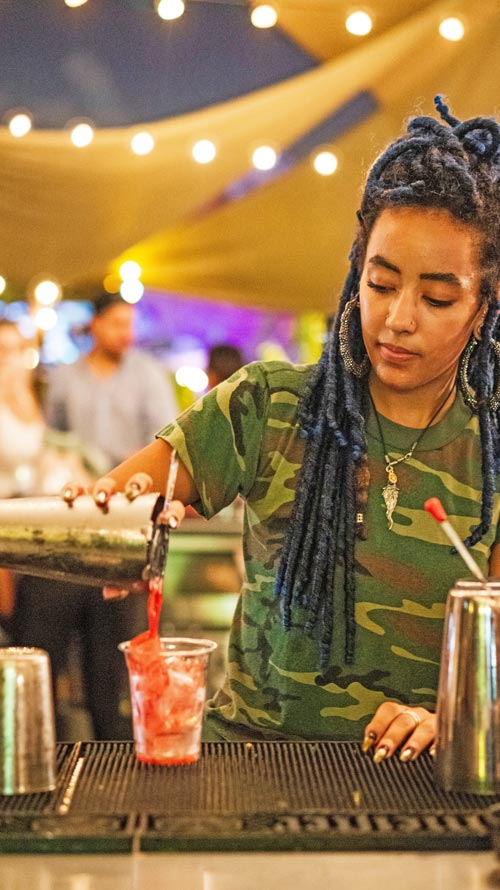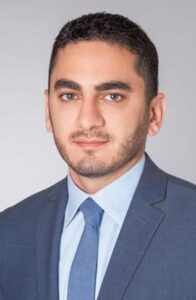
Article contributed by Mohammad Shihabi, Ellenoff Grossman & Schole LLP
Restaurant owners know that first impressions can make or break a restaurant. Whether it’s a gourmet chef or a part-time waiter, how your staff dress and groom themselves can influence your restaurant’s image and success. Creating a dress and grooming code can be challenging, often involving a balance between cosmetic desires and compliance with strict safety and sanitation regulations.
Restaurants may now need to revisit their carefully crafted dress and grooming policies. Piling on all the federal, state, and local regulatory requirements, earlier this year, the New York City Commission on Human Rights prohibited discrimination against “natural hair or hairstyles” associated with certain racial, ethnic, or cultural identities. New York City is the first jurisdiction to do so. In fact, last year, the United States Supreme Court declined to review a case that upheld a workplace ban on dreadlocks. Despite the Supreme Court’s reluctance to entertain a ban on hair discrimination, the Commission reminds employers that the City’s Human Rights Law (“NYCHRL”) is distinct from similar federal and state laws.
 The Commission’s legal enforcement guidance on hair discrimination specifically highlights protections for people who maintain particular hairstyles as part of a racial or ethnic identity, including natural hair, treated or untreated hairstyles such as locs, cornrows, twists, braids, Bantu knots, fades, and Afros, and the right to keep hair in an uncut or untrimmed state.
The Commission’s legal enforcement guidance on hair discrimination specifically highlights protections for people who maintain particular hairstyles as part of a racial or ethnic identity, including natural hair, treated or untreated hairstyles such as locs, cornrows, twists, braids, Bantu knots, fades, and Afros, and the right to keep hair in an uncut or untrimmed state.
What is prohibited?
Employers with four or more employees are now prohibited from treating workers “less favorably” than others because of their racial, ethnic, or cultural natural hair or hairstyles. Covered employers who have grooming or appearance policies must be wary of enforcing natural hair or hairstyle requirements that could subject employee to disparate treatment. Employers may not harass, impose unfair conditions, or otherwise discriminate against employees based on hairstyles associated with their race. Employers are also prohibited from banning, limiting, or placing restrictions on natural hair or hairstyles to promote a particular corporate image, because of customer preference, or under the guise of speculative health or safety concerns.
This is not to say that employers cannot impose requirements around maintaining a work appropriate appearance. Employers may enforce grooming and appearance policies so long as they don’t target any specific hair textures or hairstyles. However, even if a grooming or appearance code does not explicitly target any particular hairstyle, a seemingly neutral policy could give rise to claims. For example, employers who require employees to maintain a “neat and orderly” appearance should explain that the policy does not require employees to straighten, relax, “or otherwise manipulate their hair” to conform to employer expectations.
What are the penalties for non-compliance?
Aggrieved workers may file complaints with the Commission or lawsuits in New York State Courts. The Commission can impose civil penalties of up to $250,000 on employers that violate the law and is authorized to award a wide array of remedies to workers including hiring, reinstatement, and promotion. There is no cap on compensatory damages that a worker may recover. The Commission can also mandate changes in the employer’s internal policies and procedures. In Court, workers can seek to recover damages such as back pay, front pay, compensatory damages, punitive damages, attorney’s fees, and costs.
What about health and safety regulations?
Restaurant owners know that health and safety regulations govern everything from fingernail hygiene to body hair. So how do restaurants comply with these regulations without running afoul of the City’s anti-hair discrimination laws? Restaurants with legitimate health or safety concerns, such as for workers who handle food, may implement certain safety-related restrictions, so long as the rules apply to everyone. Before imposing an outright ban or restriction on certain hairstyles, the employer must first consider alternative ways to meet the concern including hair ties, nets, coverings, and other safety equipment.
Employers may not enforce a ban on natural hair or hairstyles based on speculative health or safety concerns. Outside of legitimate health or safety concerns, the guidelines do not permit employers to impose any restrictions – including any alternative options – on hair textures and hairstyles. Given that the Commission will closely scrutinize any policies that impose restrictions on the basis of a health or safety concern, employers must ensure that any restrictions are based on the employee’s ability to perform the essential functions of the job, as well as customer and public safety.
What about customers and members of the public?
The new law does not only apply to employees – restaurants must also be mindful of intentionally or unintentionally discriminating against customers and members of the public because of their natural hair or hairstyles. For example, customers and other non-employees should not be subjected to adverse treatment – such as refusing to seat them at the restaurant – because of their natural hair or hairstyles. The Commission provides other examples of prohibited discrimination against the public, including:
- A dance company requiring girls to remove their braids, alter their Afro, and only wear a “smooth bun” to participate in classes; and
- A nightclub telling a patron she is not welcome because her natural hairstyle does not meet their dress code.
It can be difficult to comprehend why laws like this are even necessary. Grooming standards have always been a landmine for implicit discrimination. Often, workplace appearance and safety policies are used to discriminate against racial minorities. Recognizing this reality, the Commission encourages employers to revisit their existing grooming or appearance policies to ensure that they do not overtly or implicitly subject employees to disparate treatment based on their natural hair or hairstyles.
 Mohammad Shihabi is an Associate in the Labor & Employment practice group at Ellenoff Grossman & Schole LLP in New York City. He represents and advises clients on a wide range of labor and employment matters, including on employment contracts, response to workplace complaints, and the conduct of workplace investigations, discrimination, harassment, retaliation, leave, accommodation and wage and hour issues. He also regularly defends clients in federal and state court and before various governmental agencies. He can be reached by phone at 646-895-7226 or by email at mshihabi@egsllp.com
Mohammad Shihabi is an Associate in the Labor & Employment practice group at Ellenoff Grossman & Schole LLP in New York City. He represents and advises clients on a wide range of labor and employment matters, including on employment contracts, response to workplace complaints, and the conduct of workplace investigations, discrimination, harassment, retaliation, leave, accommodation and wage and hour issues. He also regularly defends clients in federal and state court and before various governmental agencies. He can be reached by phone at 646-895-7226 or by email at mshihabi@egsllp.com























